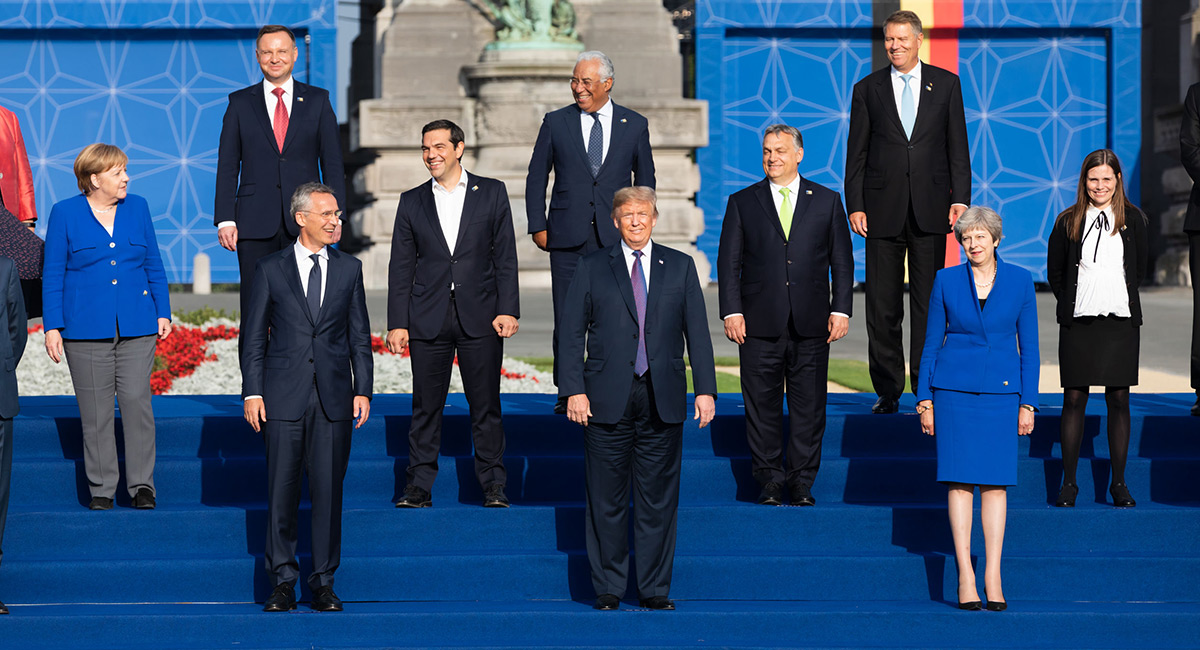President Trump’s threat to deploy the country’s armed forces to domestic protests created a justified furor—though those troops have already been withdrawn from areas in and around the nation’s capital. Given this, his less-noticed announcement that he will be bringing up to 9,500 U.S. forces home from Germany should have brought another sigh of relief.
Instead, the move has created near hysteria within the U.S. foreign policy establishment.
For example, Jim Townsend, a former Pentagon official who worked on Europe and NATO issues, was quoted in Business Insider gasping, “The Administration has just lost its mind.” Although this characterization is used often in relation to the incumbent president and many of his policies, Trump is counterintuitively on the right track on the troop withdrawal from Germany.
Germany is a fabulously wealthy country, with the largest economy in a European Union (EU) that has a combined GDP larger than that of the United States. Yet 75 years after World War II ended and about three decades after the Cold War evaporated with the collapse of the East Bloc and the dissolution of the Soviet Union—the NATO alliance’s principal enemy and reason for being—the United States still guarantees the security of these rich countries against a much diminished, but overhyped, Russian threat.
Townsend dramatically concluded, “Putin must be deliriously happy with U.S. troops in America’s streets and U.S. troops leaving European streets.” Perhaps, but so what. Although the Russians forcibly took back Crimea, a Ukrainian region of Russian affinity that had fairly recently been a part of Russia, it likely did these things to prevent Ukraine from joining NATO. President George W. Bush had promised Ukraine membership in the U.S.-dominated hostile alliance, which had been advancing toward Russia’s borders since the end of the Cold War. U.S. presidents of both parties and the American foreign policy establishment, as well as NATO governments, see NATO as having benign intentions and expect Vladimir Putin and the Russians to accept that.
But for Russia, that would be very risky indeed. Historically, Russia has been invaded many times from the west through the north European plain that runs through Poland, Ukraine, and Belarus. The last such invasion by the Nazis during World War II left a scorched Russia and 28 million dead Russians. The shrewd and ruthless Putin does not want this to happen again, yet he has seen NATO advancing toward his country. In fact, the nationalistic Putin came to power in 1999, in part, as a result of Russian humiliation by NATO expansion after it lost the Cold War, despite President George H.W. Bush’s verbal promise that the alliance would not advance.
Poland is now in NATO, and neighboring Ukraine is flirting with membership; in addition, to the north of the strategic plain, the neighboring Baltic countries of Estonia, Latvia, and Lithuania are also now NATO members. Thus, Germany is no longer on the front line of an alliance that has expanded dramatically eastward. And keeping U.S. forces in Germany to fulfill Lord Ismay’s dictum of NATO keeping “the Soviet Union out, the Americans in, and the Germans down,” is out of date, given Germany’s responsible behavior as a stabilizing force in Europe for 75 years now.
Even without NATO, the wealthy European Union could be the first line of defense against Russia, which has a GDP only the size of Italy. Yet Germany, the wealthiest of the EU nations, spends only a paltry 1.2 percent of its GDP on defense and doesn’t intend to meet the NATO goal of at least two percent by 2024 until 2031.
In fact, way back in the 1960s during the height of the Cold War, the United States should have been weaning the Western Europeans, whose economies had recovered from World War II, away from the U.S. as the primary defender of Europe. President Dwight Eisenhower had said that if U.S. forces remained in Europe indefinitely, NATO would have failed. Then, as today, the United States should have moved into a “balancer-of-last-resort” role in Europe—that is acting as the second line of defense if the balance of power got out of whack among European nations, as it successfully did during World Wars I and II. Thus, Trump’s withdrawal of 9,500 troops is a small step—although vindictively announced with no warning—toward that more sustainable American security posture.
The United States, with massive annual budget deficits and a staggering national debt of $26 trillion is vastly overextended in its policing of the entire world. The U.S. needs to let the Europeans worry about Russia (except taking a harder line policy against unacceptable Russian meddling in American elections), so that it can focus on the larger problem in East Asia of a rising China. Trump’s troop withdrawal is a tiny step toward a long overdue complete pull out of U.S. forces from Europe and a handover of primary defense responsibility to the Europeans.

















